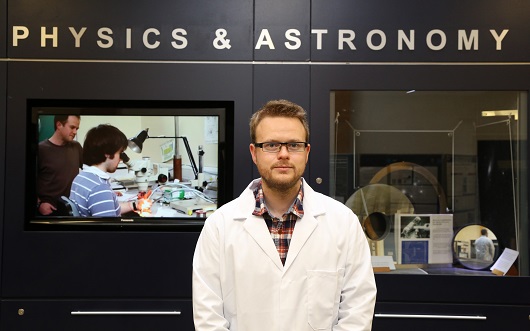Challenge accepted

Photo credit: Ian Stewart Photography
A start-up business partnership of three University of St Andrews scientists has won one of the top prizes in a national competition aimed at encouraging innovation and entrepreneurship amongst academics.
PhD research students Alexander Ward and Jack Barraclough, and postdoctoral researcher Dr Clifford Hicks, of the School of Physics and Astronomy, were awarded third place in the Converge Challenge 2014 for their company Razorbill Instruments.
The technology behind the company, and for which they won the award, is a nanopositioner – a device which can move with minute detail, especially useful in the manufacturing of microchips, and in physics and biomedical research.
As a prize for third place the partnership received a cash sum, as well as a range of business support from leading legal, financial and branding companies, to the tune of over £13,000.
Alexander Ward explained:
“We were up against some really strong opposition so were absolutely thrilled to place third. The prize money will offer us a chance to develop our prototype into a product that will be a useful tool to wide range of nanotechnologies.
“It will be a nano-‘tractor’, a robust and versatile tool used in a wide range of nano-technologies, and can move a sample with precision smaller than a thousandth of the width of a human hair.
“On top of the cash prize, the lawyer and accountancy services will be hugely useful as we get the company on its feet.”
Professor Malcolm MacLeod, Vice Principal Enterprise and Engagement at the University of St Andrews said:
“This is a fantastic achievement and we wish Alex and his colleagues well in developing Razorbill. We hope that this will be the first of many such success stories in engaging Enterprise at St Andrews.”
The award was presented at a gala dinner at Edinburgh’s Heriot-Watt University last week, which included an address from the Chief Scientific Adviser to the President of the European Commission, Professor Anne Glover CBE.
Professor Glover said:
“Yet again, the spirit of academic innovation and enterprise emanating from the university campuses in Scotland reinforces how students and academic staff are engaged with Converge Challenge.
“For five years now, Converge has been a shining beacon of academic flair and entrepreneurship, giving participants an opportunity to crystallise their research and inventions.”
Razorbill Instruments was one of 111 entrants from across Scotland to apply for the competition, undergoing a rigorous selection process including business plans, a number of pitches, and a Dragon’s Den style Q&A with a panel of judges.
Alexander also recently received a fellowship from the Royal Society of Edinburgh, which will allow him to work on a prototype of the product at the University’s physics department.
ENDS
NOTES TO EDITORS:
Issued by the University of St Andrews Communications Office, contactable on [email protected] or on 01334 462108.
NOTE TO PICTURE EDITORS:
Photographs available on request; contact Elliot Busby on [email protected] or on 01334 462108.
Information on Converge Challenge:
Converge Challenge was established in 2010 at Heriot-Watt University in Edinburgh, and is now in its fifth year. It is supported and funded by The Scottish Funding Council, as well as Scotland’s eight research universities, and is the flagship entrepreneurial business competition for academics. More information about the competition can be found here: http://convergechallenge.com/en/page/about-en
Category Awards